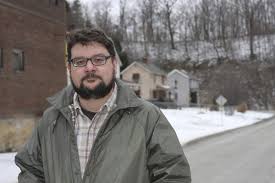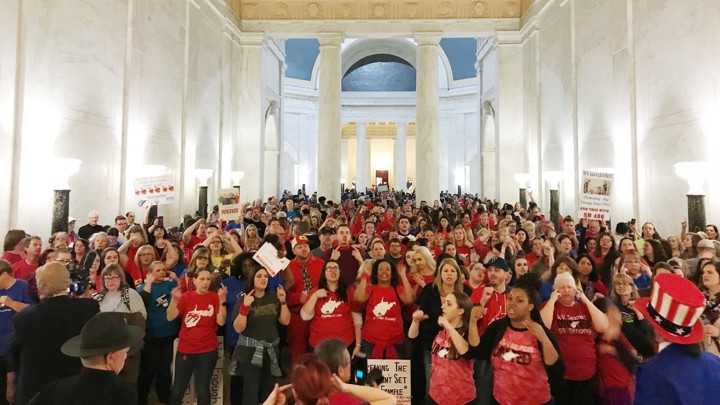By: Felicia Cooper
Dr. Lou Martin
Dr. Martin is an Associate Professor at Chatham University, teaching classes in United States and Latin American history, labor and working-class history and environmental history. He is a leader in the field of Appalachian Studies. As a contributor to this field, his work has been published in LABOR: Studies in Working-Class History of the Americas, Pennsylvania History: A Journal of Mid-Atlantic Studies, has co-edited a forthcoming book entitled Culture, Class, and Politics in Modern Appalachia with West Virginia University Press.
We’ve included the entire audio recording of this interview if you’d prefer to listen along!
What is your relationship to Appalachia?
I grew up in Northern West Virginia and I went to school at West Virginia University, and as a grad student I studied Appalachian history. As a researcher, a lot of my work is in West Virginia history, and I put it into a context of Appalachia.
What does that mean for you, to put something in the context of Appalachia?
It means a couple of things. One is that...Appalachian studies as a field has developed over the last forty years and has scholarly literature that I try to engage with as a scholar and then I also think about it in relation to the region, both as a representation of the region as well as the more physical and material connections to the region.
You mentioned that the academic field has changed. What other changes have you seen in the past ten years?
This is a complicated question, because within Appalachian studies, there are number of disciplines. The people who study Appalachia sort of found each other in the 1970s, with the Appalachian Studies Conference…
This Appalachian Studies formed because the field didn’t fit into the existing ones, and they had trouble getting respect for the work they were doing. So I would say the early days of the field, the early 80’s and 90s were really just getting the field established, which is multidisciplinary with sociologists, historians, geographers, political scientists. They also tried to make a conference open to residents, activists, community organizers, which created a very different feel at that conference. I would say the last ten and twenty years have continued to grow the conference. I would say that within my field, there have been two main themes, the first of which is a greater focus on the nineteenth century, so the civil war and race relations and politics during the reconstruction. That’s simply because it’s a small enough field that if there’s a really productive PHD advisor, they can have an influence, especially if their work is really inspiring. And that’s the case with John Inscoe who writes about race, the Civil War, and Reconstruction in Appalachia. And he’s trained a lot of young scholars. The other trend I would say is to try to have, um, an understanding of transnational Appalachia, meaning the international connections with Europe, primarily, and looking at the connections and migrations from Appalachia and Europe as well as how it fits into a world economy and to try to put it into these broader contexts
Do you find these recent trends have shaped your practice or have you gone against that grain?
I wrote a book on my home county in Northern West Virginia and how it was shaped by the political economy of the 20th century and how these workers created a different working class culture based on the rural setting they were in. These workers had a lot of connections to other parts of Appalachia with rural industrial workers. That’s a term one of my mentors used a lot, describing West Virginia - Rural Industrial.
The book is about the emergence of the culture in the early 20th century. As the early companies mechanized processes, they looked more and more to unskilled labor that they could recruit from Europe, from African Americans from the South, as well as people leaving farms in Northern and Southern West Virginia. Those people came together through millions of individual decisions. What traditions to keep, what not to, how to make a living, how to stretch a dollar. They collectively created a rural industrial culture, where they worked in the factory during the day and continued the rural habits - I shouldn’t say they worked in the factory during the day, there were multiple shifts, but, when they weren’t in the factory, they kept many of their rural habits going...keeping livestock, planting large gardens. So they kept a lot of these rural habits and grew a lot of their own food, and also had this ethic of what I call self help. They tried to do as much themselves as they could. They weren’t self sufficient, the way early settlers were. They found ways to supplement their factory wage. And that culture I described went into decline in the 60s and 70s. This was partly because wages were getting better, consumer goods getting cheaper, and the new level of consumer culture was unheard of. So a lot of the old ways tapered off. You can still see evidence of it, but I’d say it’s not as prominent as it once was.
In light of recent labor movements, what do you think of the aftermath of the WV Teachers Strike?
I believe that Appalachia has spent too much time trying to recreate the industrial past as opposed to imagining the future. One of the unfortunate byproducts of that has been to reduce labor costs as much as humanly possible. That has meant busting unions, and keeping the minimum wage the same for 25 years now. That’s along with right-to-work laws and cutting taxes, attacking the public sector’s right to form unions. And all of this, so, this runs counter to the philosophy of the 20s and 30s which talked about paying more than the bare minimum to even unskilled workers. And, to me, the direct parallel, is, you have tens of thousands of teachers in WV whose salaries have been frozen, and the cost of healthcare more and more shifted onto them. And, I know people will get into philosophical arguments about taxpayer money, but the biggest beneficiary of these tax cuts have been out of state corporations. And now the biggest landholder in WV is...Timberland...some out of state company. And now these out of state and international companies have more money than they know what to do with, and they avoid paying another 3% in taxes. So these cuts have benefited outside corporations and outside investors. And the detriment is not only to the teachers, but the local economies that depend on teachers salaries. And this is just part of this moment of thinking that we’re in about how to drive down each others wages, which has not been a good thing for the region.
There was a communication workers strike shortly afterward the WV Teachers Strike. It just so happened that red is the color that the communication workers wear on strike all the time. They have for many years. But a lot of the teachers were saying, we can’t forget about these folks either. The other thing is, teachers are keenly aware of the struggles of their students, and they made provisions for kids who would be without lunch those days and things like that. I thought they did it really well.
West Virginia Teachers Strike, Photo by Robert Ray
How can we as individuals be inspired by the teachers and share the power within our communities?
It’s a big question. I think the key is collective action. This has been proven time and again, that even poor people can wield a lot of power in society when they band together. I think however, there have been systematic efforts to disempower people and to divide people. There have been some real basic obstacles to overcome, to make people feel like their voice matters and that they have power to band together. That’s not easy to do, especially in places with underemployment and disappearing land. There’s some huge hurdles to clear, and the teachers have given others a path to look at. They had a lot of good things on their side, including...they’re all essentially answering to the same legislature, their work and insurance is tied to the same legislature, and they have shared worker experience and shared life experience.
That isn’t always the case when you try to create, say, a community food network. You don’t have people with the same employers or even living similar lives, so it’s a lot of work in situations like that. It’s not like when everyone worked at the steel mill and experienced the same struggles, grievances, and losses at the same time and could unite and fight those things. People are experiencing many similar things, but in different times and different ways, and they don’t have that union or single employer to bring them together. Many people do not believe that government can function in a way that makes our lives better, so it’s difficult to try to imagine what that could be.
What is Appalachia?
Appalachia is a mountain range that stretches from New York down to Alabama but the use of the word Appalachia really became popularized in the mid to late nineteenth century, in a lot of travel writing, about these exotic people in an exotic place called Appalachia. According to one travel writer, “Strange land with peculiar people!” And the people who thought of themselves as modern, urban middle class readers could be amused by these people awakening from a Rip Van Winkle like sleep in a modern world untouched by modern ways. So, because of that association with a certain culture, people have come to associate it with what many Appalachian studies scholars would call “Central Appalachia.” Coal-producing counties in the most mountainous part of the the region. That’s usually, if you see Appalachia today, that’s what the average New York Times reader will think of. But more scholars are claiming the geographical region can’t be boiled down to one thing, and to bring attention to the diversity of landscape, people, and culture. So, when scholars today say Appalachia, they probably mean a larger, more diverse culture.


